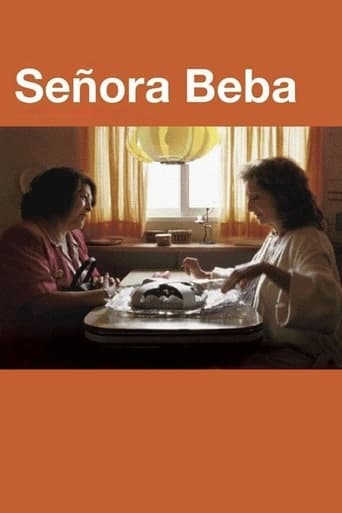Buenos Aires is in a deep recession. As the money runs out, the relationship between an employer and her live-in maid changes dramatically.


Reviews
This film to me is undoubtedly one of the rare and stupendous examples of what they call (in the best sense possible) - an "actors' director", or in this case, rather - an actresses' one. I shall not bore you with the plot, it is all in the respective IMDb section, instead I will tell why I consider this a must-see for anyone who appreciates stories about relationships, who enjoys and values the intricacies of a female character (in this case - two rather opposite ones) beautifully unfolded. The love-and-hate relationship between the lady of the house (a bit delusional, totally broke and trying desperately to save her face) and her mucama, played to perfection by the grand Norma Aleandro and the fantastic discovery of Jorge Gaggero - Norma Argentina. What amazes me is how incredibly sensitive the director is to the enormous difference in characters of the actresses and their approaches, how seamlessly he makes that gap serve the purpose of his brilliantly written story. Every scene is a master class in subtlety, wit and purposefulness. In my view, many new directors will benefit enormously if they watch the film with an open mind. I was astonished by the fact that Ms. Argentina had never appeared on screen or stage before, she is breathtakingly effective in every shot, and the honest simplicity she contrasts to Aleandro's sophistication is a delight to observe. Absolutely recommended - the film is made with very apparent love for the woman, for Argentina and exquisite artistic taste and mastery. 10/10 from me.
Beautifully written and directed by Jorge Gaggero, "Live-in Maid" is a bit like an Argentine version of "Driving Miss Daisy." Beba (Norma Aleandro) is an aging divorcée from the privileged upper classes whose ever-worsening financial situation is making it harder and harder for her to maintain herself in the style to which she is accustomed - including paying the salary of Dora (Norma Argentina), her loyal but long-suffering housekeeper who has put up with her boss' moodiness, petulance and condescending attitude for thirty years now. Yet, as in "Miss Daisy," the relationship between these two women cannot be pigeonholed quite so neatly. In fact, their story, rich in ambiguity and emotional complexity, comes to reflect in miniature the much broader conflict that exists between the ruling class and the servant class in our society. In truth, there is no logical reason why these two individuals from wildly divergent social backgrounds should even be expected to get along at all. Certainly, Dora has every reason to resent Beba for her privilege, her rank and the often imperious manner in which she treats her. Yet, in her own way, the stoic, taciturn Dora comes to pity Beba for the hard times, both financially and emotionally, that the previously pampered woman suddenly finds herself going through. Indeed, things get so bad for Beba that she is forced to sell virtually everything she owns to keep herself afloat, and even has to humiliate herself by trading merchandise for food in a second-rate cafeteria. In addition, Beba's grown daughter wants to play as little a part in her mother's life as possible. In the same way, although Beba clearly doesn't treat Dora as her equal, she understands deep down inside that this "subordinate" is also probably the only real companion left to her in the world, the one person she can reach out to for comfort and support. The relationship between them may be one of mistress and servant, but the two parties also have much that unites them, including the problems common to women their age, their concomitant struggles with money, and the fact that fate has thrust them together for such prolonged and extended periods of time that they can't help but get to know one another on an intimate level. It is the discovery of their common humanity, brought about by this enforced closeness, that finally allows their relationship to blossom into a friendship between equals that crosses class lines.On a sociological level, the movie points out the irony that it is the people with the most power who, when the chips are down, are really the most helpless and fragile - and the people with the least power who are the most persevering and tough and seemingly most equipped to cope with the vicissitudes of life. Superbly understated performances by the pair of Normas - their scenes together are really quite breathtaking and quietly masterful - as well as flavorful and subtle storytelling make "Live-in Maid" an intensely poignant, wholly believable and thoroughly absorbing experience throughout.
I haven't seen a lot of Argentinian films, but I have enjoyed immensely the ones I have. This is a great example of the art-house films that are made in Argentina.Jorge Gaggero was honored not only in Argentina, but at Sundance for this work that he wrote and directed.It tells the story of a rich woman, Beba(Norma Aleandro, The Official Story), who has fallen on hard times and cannot afford to pay her electric or phone, much less her maid. The Maid, Dora (Norma Argentina in her first role), is trying to build a house on the outskirts of town and needs the money to finish, so she quits to find another job.Everything is done with grace, as Beba tries to keep up appearances, even as she has resorted to selling cosmetics door-to-door to pay the bills, or in some cases, just to eat. The dance between employer-employee becomes more and more intricate as the power relationship changes.The ending was a big surprise, but a testament to the love these two women had built up for each other over 30 years.A superb film.
This slow but involving human drama takes Argentina's recent economic meltdown as its prompt. Cama Adentro means 'live-in maid': Jorge Gaggero's sensitive film pursues the deep but uneasy relationship between the genteel, newly-impoverished Beba (Norma Aleandro) and Dora (Norma Argentina), the servant with whom she's shared her Buenos Aires apartment for almost 30 years.Sudden lack of money has flipped the pair's dependency. Unable to pay her maid for several months, lonely, prideful Beba stands to lose the only reliable company she's known (her daughter, like her husband, has previously departed - alienated, we're left to assume, by Beba's haughtiness). Dora, meanwhile, must decide whether to stay and assist her unravelling employer, or take her chances in an economy with fewer and fewer jobs.What could have become gooey and trite in the hands of a lesser director is instead rendered plausibly complex: the women struggle to preserve their dignity in straitened circumstances, and to forge a new accord based on mutuality rather than compulsion. Both Beba and Dora are endearingly flawed - the former supercilious and unyielding, the latter torn between contempt and sympathy for her former boss. Argentina is gruffly impressive as the emotionally-contained maid, while Aleandro's monstrous but piteous snob is an equally sharp portrayal. In Gaggero's measured telling, the pair's not-quite-friendship rings all the more true for being revealed with unsentimental compassion.
















